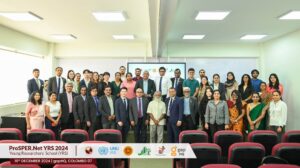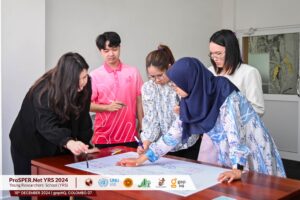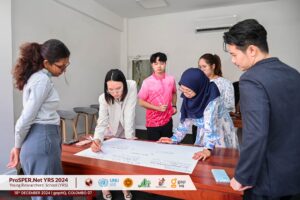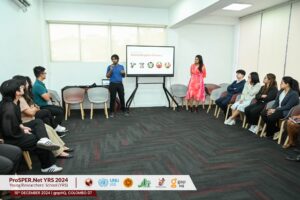
The ProSPER.Net Young Researchers’ School (YRS) was conducted in person for the first time since 2019, bringing together 14 promising young scholars to delve into the pressing issues of climate change and sustainable development. Co-organised by the University of Peradeniya (PDN) and United Nations University Institute for the Advanced Study of Sustainability (UNU-IAS, in its role as ProSPER.Net Secretariat), this year’s YRS was held in Colombo and Kandy, Sri Lanka, from 16 to 22 December 2024. Participants included masteral and doctoral students from 11 ProSPER.Net member universities and 3 Sri Lanka universities.
With the theme, “Building Resilience: Integrating Nature-Based Solutions for Climate Change Mitigation”, the 2024 YRS highlighted natural processes and ecosystems to address the negative effects of climate change, while simultaneously providing co-benefits for biodiversity, water security, and human well-being.
As in previous editions, this year’s YRS offered an immersive learning program for young scholars, with its activities – blended-learning style workshop, transdisciplinary research collaboration, lectures, field visits – centering on innovative approaches to environmental challenges.
The opening ceremony on December 16 set an inspiring tone, with welcome and opening remarks from Prof. Ranjith Dissanayake (PDN), Prof. Shinobu Yume Yamaguchi (Director, UNU-IAS), followed by a keynote from ornithologist and environmentalist Emeritus Prof. Sarath Kotagama. A symbolic oil lamp lighting marked the official start of the programme.
 Day 1 of the 2024 YRS kicked off with a series of lectures, with expert resource persons imparting knowledge to the YRS participants. First, an introductory lecture on the 2030 Agenda and the Paris Agreement was delivered by Dr. Nafissa Insebayeva (UNU-IAS), which explored the interconnected goals aimed at sustainable development and climate action. Prof. Ranjith Dissanayake (PDN) subsequently delivered a lecture which focused on cutting-edge solutions and strategies all geared towards mitigating the effects of climate change. Lastly, Dr. Shakti Gunawardene of Curtin University delivered a lecture on how climate change and non-climatic factors are reshaping hydrological systems. Capping off Day 1 was a group activity titled “Seeds of Thoughts: Reflecting on Nature and Civilization”, where participants contemplated on the Day 1 lectures as well as the intricate relationship between humanity and the natural world through a creative and collaborative reflection activity.
Day 1 of the 2024 YRS kicked off with a series of lectures, with expert resource persons imparting knowledge to the YRS participants. First, an introductory lecture on the 2030 Agenda and the Paris Agreement was delivered by Dr. Nafissa Insebayeva (UNU-IAS), which explored the interconnected goals aimed at sustainable development and climate action. Prof. Ranjith Dissanayake (PDN) subsequently delivered a lecture which focused on cutting-edge solutions and strategies all geared towards mitigating the effects of climate change. Lastly, Dr. Shakti Gunawardene of Curtin University delivered a lecture on how climate change and non-climatic factors are reshaping hydrological systems. Capping off Day 1 was a group activity titled “Seeds of Thoughts: Reflecting on Nature and Civilization”, where participants contemplated on the Day 1 lectures as well as the intricate relationship between humanity and the natural world through a creative and collaborative reflection activity.
 Day 2 featured lectures from experts intended to build the capacity of participants as researchers. Prof. Guttila Jayasinghe (University of Ruhuna, Sri Lanka) delivered lectures on scientific writing and research communication, which covered principles and strategies for effectively presenting research findings using engaging formats while adhering to academic standards. Mr. Jerome Silla (UNU-IAS) delivered a lecture on “Empowering Youth on Driving Innovation”, intended to help transform their ideas into impactful innovations addressing real-world challenges. Prof. Chaminda Bandara of PDN delivered a lecture on “Designing Sustainable Cities with Nature-Based Solutions” where the integration of ecological principles into urban planning was emphasized. To synthesize the Day 2 lectures, participants engaged in group activities: “Roots of Synergy”, where they formed teams to collaborate on developing a thematic research proposal; and “The Green Fusion: Merging Expertise for Adaptation”, where participants shared their expertise, identified synergies, and crafted innovative research ideas through team-building exercises, group discussions, and creative pitching.
Day 2 featured lectures from experts intended to build the capacity of participants as researchers. Prof. Guttila Jayasinghe (University of Ruhuna, Sri Lanka) delivered lectures on scientific writing and research communication, which covered principles and strategies for effectively presenting research findings using engaging formats while adhering to academic standards. Mr. Jerome Silla (UNU-IAS) delivered a lecture on “Empowering Youth on Driving Innovation”, intended to help transform their ideas into impactful innovations addressing real-world challenges. Prof. Chaminda Bandara of PDN delivered a lecture on “Designing Sustainable Cities with Nature-Based Solutions” where the integration of ecological principles into urban planning was emphasized. To synthesize the Day 2 lectures, participants engaged in group activities: “Roots of Synergy”, where they formed teams to collaborate on developing a thematic research proposal; and “The Green Fusion: Merging Expertise for Adaptation”, where participants shared their expertise, identified synergies, and crafted innovative research ideas through team-building exercises, group discussions, and creative pitching.
 A continuation of capacity building lectures were conducted on Day 3. Dr. Sepalika Sudasinghe (National Science Foundation) spoke about “Work-Study-Life Balance for Better Results” and underscored the importance of managing time and energy across professional, academic, and personal domains to achieve optimal performance and well-being. Prof. Ajith de Alwis (University of Moratuwa, Sri Lanka) presented on “Innovative Financing Models for Climate Resilience Projects” and explored how to mobilise resources for climate adaptation and resilience initiatives. Dr. Suneetha Subramanian (UNU-IAS) delivered an online lecture on “Resilience and Community Engagement”, highlighting the critical role of local communities in building resilience against climate-induced challenges. Conducted in between the Day 3 lectures were two group activities: “The Capacity Canvas”, where participants collaboratively mapped their methodological strengths, fostering a deeper understanding of individual and team capabilities; and “Strengths Blueprint”, where teams were guided in crafting a tailored methodology for their chosen research area, which culminated in the creation of a comprehensive research process diagram.
A continuation of capacity building lectures were conducted on Day 3. Dr. Sepalika Sudasinghe (National Science Foundation) spoke about “Work-Study-Life Balance for Better Results” and underscored the importance of managing time and energy across professional, academic, and personal domains to achieve optimal performance and well-being. Prof. Ajith de Alwis (University of Moratuwa, Sri Lanka) presented on “Innovative Financing Models for Climate Resilience Projects” and explored how to mobilise resources for climate adaptation and resilience initiatives. Dr. Suneetha Subramanian (UNU-IAS) delivered an online lecture on “Resilience and Community Engagement”, highlighting the critical role of local communities in building resilience against climate-induced challenges. Conducted in between the Day 3 lectures were two group activities: “The Capacity Canvas”, where participants collaboratively mapped their methodological strengths, fostering a deeper understanding of individual and team capabilities; and “Strengths Blueprint”, where teams were guided in crafting a tailored methodology for their chosen research area, which culminated in the creation of a comprehensive research process diagram.
Day 4 was highlighted with field visits to the Tailor Store and Giragama Tea Factory, which complemented the YRS lectures with real-world context on nature-based climate action strategies. The YRS programme was punctuated with group activities on Day 5: “Impact Pathway”, where participants’ teams identified and mapped key concepts, thereby ensuring their research aligns with theory, policy, and practice; “The Proposal” where teams developed comprehensive research proposals based on the main YRS theme; and “Circle of Insight”, where participants’ teams engaged in peer-to-peer feedback exchange, providing constructive insights to each others’ research proposals.
The following research proposals were developed by the YRS participants:
- Building Resilient Reefs in Response to Climate Change : A Comparative Analysis of Bolinao and Lakshadweep
- “Gamification”: An Innovative Tool to Build Urban-Coastal Resilience with Nature
- Nature-based Solutions for Food Waste Management: A Pathway to the Bio-Circular Green Economy in Local Restaurants of Pathum Wan District, Bangkok, Thailand
After the YRS, the young researchers also attended the 15th International Conference on Sustainable Built Environment, held from 20 to 22 December 2024. The conference provided another opportunity for them to deepen their knowledge and discuss cutting-edge, nature-inspired solutions for a sustainable future. The participants engaged in dialogue with policymakers, academics, and industry leaders. Conference activities included paper presentations, panel discussions, a 3MT competition, and a Climate Fresk workshop.
About the YRS: The YRS provides a unique opportunity for young scholars to explore innovative, nature-based approaches to climate change mitigation. Aligned with the principles of Action for Climate Empowerment (ACE) under the UNFCCC, the program aims to empower participants to contribute to global efforts in reducing GHG emissions, enhancing resilience, and promoting sustainable development. It fosters synergy and knowledge exchange among participants, offering avenues for interdisciplinary research collaboration and action through interactive sessions, panel discussions, and workshops.
The ProSPER.Net Secretariat would like to thank co-organiser University of Peradeniya, its staff and students, as well as the support from gapHQ, for the superb organisation and tireless dedication in delivering a successful Young Researchers’ School.
Photo credits: Amanda Wijesooriya
